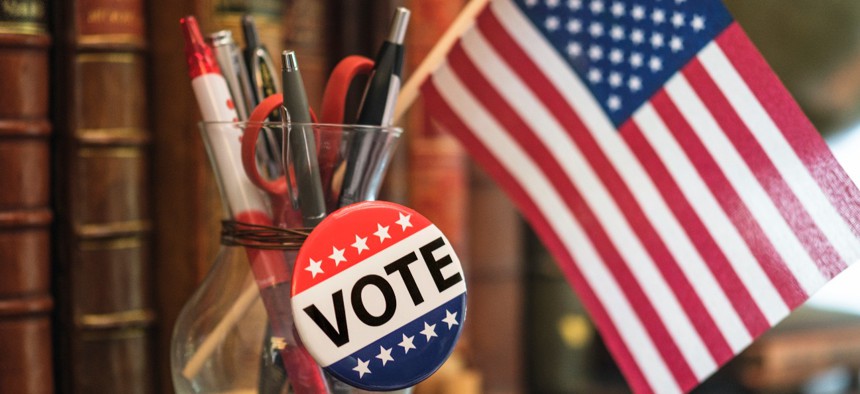
Most federal employees are allowed to do campaign-related activities. Tetra Images / Getty Images
Can federal employees take part in political campaign activities? Election season do’s and don’ts
The third installment in a series about the rules and policies federal employees should know ahead of the elections.
Updated July 2024
Campaign activities are in their final stretch and federal employees might be wondering if they can get involved.
Federal employees are subject to the Hatch Act, which restricts their political activity to various degrees, depending on their position. But the law still allows for most to do campaign-related things.
“Any federal employee, less restricted or further restricted [by the Hatch Act], can attend campaign events as long as they're off duty and they're not attending in their official capacity or anything like that,” an attorney in the Hatch Act unit of the Office of Special Counsel told Government Executive in 2022. “All employees can attend. Less restricted employees can actually speak at campaign events. But further restricted employees cannot.”
Most federal employees fall under the “less restricted” category and are afforded more ability to engage in off-the-job partisan political activity than those in the “further restricted” category, which includes federal employees at investigative and enforcement agencies. Federal employees should be aware that some agencies place employees in a further restricted category who otherwise would not be (for example the Justice, State, Homeland Security and Defense departments).
Both less restricted and further restricted federal employees can put signs in their yards supporting a partisan political candidate, OSC says on its website.
The Hatch Act still applies to federal employees even if they take a leave of absence to work on a campaign.
“While the act permits less restricted employees to actively participate in partisan political management and partisan political campaigns, those employees are nevertheless prohibited, at all times, from using their official authority or influence for the purpose of affecting the result of an election; knowingly soliciting, accepting, or receiving political contributions from any person; being candidates for public office in partisan elections; and knowingly soliciting or discouraging the political activity of any individual with business before the employee's agency,” OSC stated on its website.
The same goes for further restricted employees, but they also can’t take “an active part in partisan political management and partisan political campaigns.”
More frequently asked questions and answers about campaign activities and Hatch Act considerations overall can be found on OSC’s website.
Feds Running for Office
Both less and further restricted employees can be candidates for public office in nonpartisan elections, which is when candidates are listed on the ballot without party labels. A common example is school board elections. They generally cannot be candidates in partisan elections, but there are certain circumstances in which federal employees can be independent candidates in local partisan elections, OSC said.
A National Oceanic and Atmospheric Administration employee was removed from federal employment in 2023 after running for Congress several times over the prior decade.






